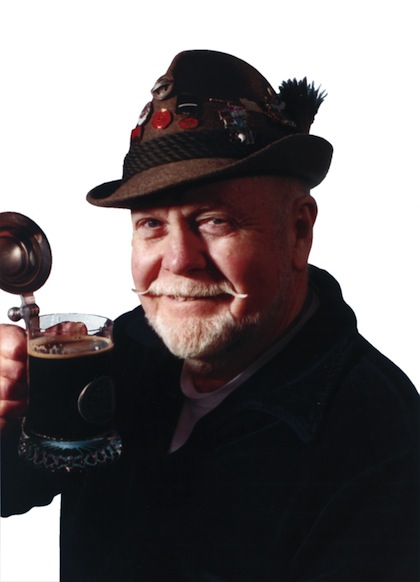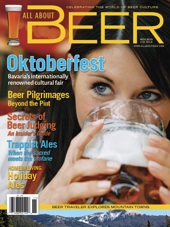Every once in a while, when the room is quiet and I have a freshly poured beer in my glass, I put my beer to my ear and listen. I’ve been doing this for a long time now (20 years or more), and the reader may well inquire about my purpose.
In a moment of frivolity, I told him that in addition to sniffing, sipping, slurping, swallowing and summarizing his beer, he should also sound it out by listening to it.

As is usual with most of the weirder things I do, it all started out as a spoof.
In 1976 I started publishing a small journal, Amateur Brewer, a publication far ahead of its time, with off-beat information on homebrewing arts. It was supposed to be quarterly, but it never achieved that modest goal; even the first issue was late. I published 12 of them, and not one was sent out on time. Number 12 was published in 1985. Each was better than its predecessor, but I had finally gone as far as I could. Subscription was $8 a year, and I never had even 200 subscribers. I wasn’t interested in the promotional aspects of the thing, and I couldn’t afford to spend more time on it, so I simply quit.
A Spoof Turns Serious
However, after Number 9 was sent out, I started a smaller companion newsletter, Talk to Your Beer. TTYB was intended to fill in the gaps between the ever more unwieldy ABs. The idea came from my gardener friends who told me that they talked to their plants, because plants were alive. I realized that one should talk to one’s fermenting beer for the same reason. It is indeed alive.
Then it occurred to me that there was an equal need for listeners, because folks were beginning to enjoy learning about the good taste of beer and about various beer styles. Another newsletter seemed necessary. I called it Listen to Your Beer I got that from my mother, whose favorite complaint was always, “Listen to your mother.” She hurled that at me often, during my infrequent visits, when she perceived that I was not paying full attention to her. Never mind that I was past the fully ripe age of 50 years.
LTYB was published (always late) on a bimonthly schedule. I had the same problems with Listen as I’d had with TTYB and AB. They took too much time, and I had no ability to promote them. But it was great fun.
Then I started writing for the Seattle Times and found myself spending more time in Seattle, 160 miles north of my home in Portland. I was invited to several beer tastings by a local importer who was trying to learn more about beer. In a moment of frivolity, I told him that in addition to sniffing, sipping, slurping, swallowing and summarizing his beer, he should also sound it out by listening to it.
I told him that nonsense while chuckling to myself. Later, I felt a little guilty, but do you know what? I found that there WAS something to hear. I’ve been doing it seriously since that time.
Listen to Your Beer
Have you ever really paid attention to your beer. Have you hugged it? Do you listen to the snap, crackle, pop of the head? Are you attentive to the ceremony and ritual of beer?
The sound of beer is a function of head collapse. The beer must be poured properly to encourage good head formation. If poured down the side of the glass, the beer may produce little or no head. If the bottle is shaken, or if the beer is poured too vigorously, the head will overwhelm the glass. If that happens, there will be sound, but it will not have much character.
The head collapses at a given rate depending, to a great extent, on the carbon dioxide content and its retention. This in turn is bound up with, and related to, the colloidal content of the beer, a factor of protein as well as CO2 content. Bottle conditioned, or krausened, beers are better in this respect than artificially carbonated beer.
Another factor influencing the rate of head collapse, and hence the sound, is the bacterial configuration working on the beer. If there are contaminating bacteria, the head structure and the sound will be influenced. Beers infected with excessive wild yeasts, or even lactobacillus or (worse) acetobacillus, will usually have a fast-running buzz about them, and the head will collapse at a faster rate, often disappearing within seconds.
But other factors are also involved. If the beer is too warm, the head collapse will be too fast. Of course, the opposite occurs if the beer is too cold. The head sparkle is important in a good beer’s presentation.











